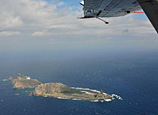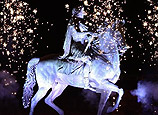
Although the DPJ lost the election, it still remains the largest party in the upper house. Abe said his party will also work to gain understanding of other parties in the upper house.
Meanwhile, the LDP and its ally agreed to form a coalition government as they have won the majority of seats in the election. The two parties said they will hold consultations after the election so as to coordinate their policies prior to the launch of the coalition.
Abe ruled out the possibility of cooperating with the DPJ in the new government, saying if the LDP cooperates with DPJ, it will be a betrayal of the people. However, he said the two parties may cooperate in certain fields such as taxation and social security reform.
On foreign policies, Abe said his party does not intend to heighten tension with China and it will seek to improve the bilateral relations with China as soon as possible.
He also said he will visit the United States after becoming the country's new prime minster in a bid to enhance the bilateral alliance.
Compared with the landslide win of the LDP, the DPJ led by Prime Ministers Yoshihiko Noda secured just 57 seats, suffering a big defeat in the election.
As a result, Noda quit the presidency of his party.
"The greatest responsibility of the great defeat falls on me as the leader of the party. I accepted the consequences thoroughly and I resign from the post as president of the Democratic Party of Japan," Noda said sadly with tears in his eyes.
Noda said it is regrettable that although he and his colleagues have worked hard during the three years in the government, they lost a lot of important comrades and colleagues.
Noda said his party will hold an assembly as soon as possible to choose a new leader, adding that the DPJ will once again get support from the public.















 Residential building collapses in E China's Ningbo
Residential building collapses in E China's Ningbo


![]()
